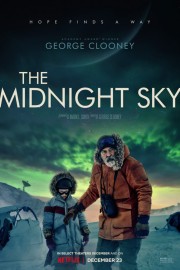The Midnight Sky
George Clooney’s directorial career is not a sterling one in terms of overall acclaim, but it’s an interesting one in the types of stories and challenges he has set out for himself. Whether it’s showing the power of journalism over political rhetoric (“Good Night, and Good Luck.”) or a wild “true story” (“Confessions of a Dangerous Mind”) or a “men on a mission” war film (“The Monuments Men”) or a political muckraker (“The Ides of March”) or a silly football comedy (“Leatherheads”), his films have been uneven collectively, but compelling in how he brings an attention to detail to the worlds he is bringing to life. Here, he shoots for the stars in “The Midnight Sky,” and it is quite ambitious in its narrative, but personal in how he brings it to life. Like most of his other films, it’s a mixed bag, but almost immaculately crafted.
“The Midnight Sky” is adapted from the book by Lily Brooks-Dalton, and in it, we get George Clooney as Augustine, a scientist working in the Arctic Circle at the moment of a global catastrophe. We never find out what the catastrophe is, but it is enough that it leaves communication at a minimum, and Augustine as a lone beacon of hope for humanity’s survival. He finds a young girl (Iris, played by Caoilinn Springall) whom was left behind in the evacuation, and though she does not talk, she is a good companion for the solemn Augustine, who must find a way to communicate with a spaceship that was exploring a possible new home for humanity, and tell them they cannot return to Earth.
I’m curious what brought on this past decade’s interest in “lonely astronaut” movies. I think I get Clooney’s interest, because this is his third such film (“Solaris,” “Gravity”), but it seems like filmmakers of late have been trying to commercialize the formula (such as it is) of “2001: A Space Odyssey” with ambitious movies like “Interstellar,” “Ad Astra,” “Aniara” and “High Life,” as well as more commercial efforts such as “The Martian” and “Passengers,” which fits in the same mold. It is a formula that allows you to isolate individuals, and have them make complicated decisions on how they will survive. I have to say, though- I’m kind of drawn to that formula, as well, and Clooney understands, instinctively, why it’s so compelling. “The Midnight Sky” is not a great example of the genre, though- it’s certainly got the ideas and characters to draw us in, but there’s also two stories that are only barely linked narratively that actually would have made far more fascinating stories on their own. The scenes with Augustine and Iris make for fascinating drama themselves, as Augustine has stayed behind of his own volition- he doesn’t have anyone to go home to, and having Iris to look after gives us a view into his character that keeps us engaged. Meanwhile, we also have the crew of the spaceship (Felicity Jones, David Oyelowo, Kyle Chandler, Demián Bichir and Tiffany Boone), who thinks they are coming home with good news about survival, but will have tough decisions to make. Either one of these feel like a full movie in and of themselves, which is part of the disconnect between the two stories- maybe if we understood more whether the events on Earth, and the trials in space the crew faces coming home, were connected, we would feel a natural connection between the two threads.
Emotionally, the film just doesn’t land the way some of those other movies do, but as with his other films as a director, Clooney has made a striking world to experience on all levels. The visuals are stark and give us a sense of dread at what might happen, and Alexandre Desplat’s score is beautiful to listen to- he understands the emotions Clooney is wanting us to feel, even if the film is unable to make us feel them ourselves. Sometimes, that would be enough; here, it leaves us wanting more.










